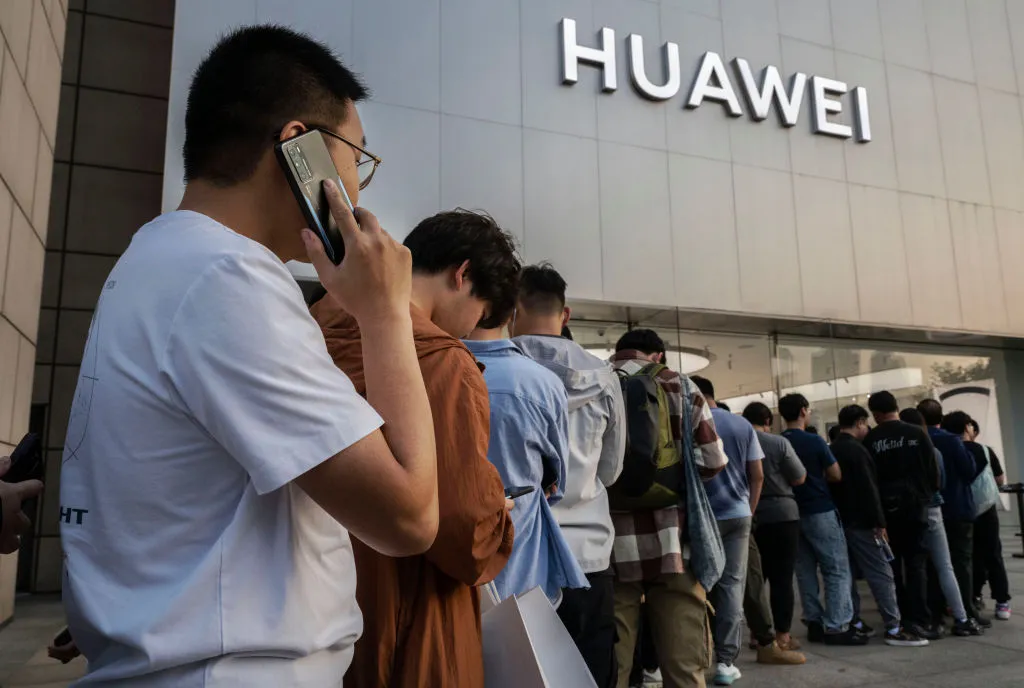
Huawei Technologies Co. is on the verge of achieving a significant milestone: nearly one billion active consumer devices. This progress highlights the US-sanctioned company’s aggressive push to rival Apple Inc. in the crucial Chinese market.
The number of Huawei devices operating on its proprietary HarmonyOS has reached approximately 900 million, marking a substantial increase in just a few months, according to Richard Yu, Chairman of Huawei’s consumer business. This growth reflects a significant shift in the consumer electronics landscape, particularly in China, where Huawei has strengthened its foothold against competitors.
Yu shared these insights at Huawei’s annual developer forum on Friday, where he also revealed a 72% increase in sales of Huawei’s premium smartphones during the first five months of 2024. This surge is largely attributed to the success of the Mate 60 Pro, which features a groundbreaking 7-nanometer processor. This technological advancement defied expectations, as US officials did not anticipate Chinese firms to develop such sophisticated capabilities independently.
| Metric | Value |
|---|---|
| Devices with HarmonyOS | 900 million |
| Increase in Premium Phone Sales | 72% |
| Quarterly Profit Increase | 500% |
| Wearables Shipped | 11 million |
| Market Share Gain | Surpassed Apple in China |
This phenomenal performance has significantly bolstered Huawei’s profitability, with the company reporting more than a fivefold increase in profits for the March quarter. The surge has also enabled Huawei to capture market share from both Apple and other Chinese competitors.
Yu passionately conveyed Huawei’s vision and resilience at the forum, stating, “No one can extinguish the starlight in the sky. Today, the future of HarmonyOS is set. Let’s enjoy the brilliant galaxy that belongs to us.”
- HarmonyOS Expansion: Beyond smartphones, Huawei has integrated HarmonyOS into a wide range of products, including watches and televisions.
- Market Leadership in Wearables: Huawei shipped approximately 11 million wearable devices in the first quarter, surpassing Samsung Electronics Co. in shipments.
- Market Share: HarmonyOS overtook Apple’s iOS in Chinese market share for the January-March period, driven primarily by the popularity of Huawei’s smartphones.
Looking ahead, Huawei plans to launch a successor to its flagship smartphone, the Mate 70, later this year. Yu disclosed that this new device will operate on HarmonyOS Next, which will further distance Huawei from Google’s Android ecosystem. A beta version of this operating system is expected to be available to consumers around August.
Huawei’s ambitions extend beyond smartphones. The company is increasingly monetizing HarmonyOS as its user base grows, with considerations to take a percentage of in-app purchases. This move signifies Huawei’s growing confidence in competing directly with Apple’s iPhone. However, notable exceptions, such as Tencent Holdings Ltd’s WeChat, are expected to remain outside this revenue model.
In addition to its advancements in consumer electronics, Huawei is making significant strides in artificial intelligence and semiconductor technology. The company’s Ascend GPU represents a critical component of its expanding portfolio of chips. This development positions Huawei as a formidable competitor to industry giants like Nvidia Corp.
Chinese firms, including Huawei, are actively developing domestic alternatives to advanced AI accelerators, such as those produced by Nvidia, which the US has restricted from the Chinese market. This initiative is central to Beijing’s broader goal of achieving parity with the US in AI and semiconductor capabilities.
At the developer forum, Yu highlighted the superior performance of Huawei’s Ascend processors, which are claimed to be 1.1 times more effective in training AI models compared to mainstream counterparts. Although he did not specify competitors by name, Yu emphasized the significant impact of these processors on the local tech landscape. Huawei has already established three AI data centers in China, powered by Ascend chips, to support local enterprises in developing and hosting AI services.
- Mate 70 Release: Huawei’s upcoming flagship smartphone, slated for release by the end of the year, is expected to enhance its competitive edge.
- HarmonyOS Next: The next iteration of HarmonyOS will strengthen Huawei’s independence from the Android ecosystem.
- In-App Purchase Revenue: Huawei’s strategy to monetize HarmonyOS through in-app purchases is a bold move to increase its market competitiveness.
- AI Data Centers: The establishment of AI data centers underscores Huawei’s commitment to fostering local innovation in artificial intelligence.
Huawei’s relentless pursuit of innovation and market dominance continues to redefine the technological landscape in China. As the company approaches the milestone of one billion active devices, it stands poised to challenge global leaders in both consumer electronics and AI technology. With its expanding product ecosystem and strategic advancements, Huawei is charting a course towards sustained growth and competitive success.
Related News:
Featured Image courtesy of CCN.com
